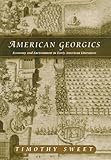American Georgics : Economy and Environment in Early American Literature / Timothy Sweet.
Material type: TextPublisher: Philadelphia : University of Pennsylvania Press, [2013]Copyright date: ©2002Description: 1 online resource (232 p.)Content type:
TextPublisher: Philadelphia : University of Pennsylvania Press, [2013]Copyright date: ©2002Description: 1 online resource (232 p.)Content type: - 9780812236378
- 9780812203189
- American literature -- History and criticism
- Didactic literature, American -- History and criticism
- Economics and literature -- United States -- History
- Environmental literature -- History and criticism
- Pastoral literature, American -- History and criticism
- American History
- LITERARY CRITICISM / American / General
- American History
- American Studies
- Cultural Studies
- Literature
- 810.9355
- online - DeGruyter
- Issued also in print.
| Item type | Current library | Call number | URL | Status | Notes | Barcode | |
|---|---|---|---|---|---|---|---|
 eBook
eBook
|
Biblioteca "Angelicum" Pont. Univ. S.Tommaso d'Aquino Nuvola online | online - DeGruyter (Browse shelf(Opens below)) | Online access | Not for loan (Accesso limitato) | Accesso per gli utenti autorizzati / Access for authorized users | (dgr)9780812203189 |
Frontmatter -- Contents -- Introduction -- Chapter 1. Economy And Environment In Sixteenth-Century Promotional Literature -- Chapter 2. "God Sells Us All Things For Our Labour" John Smith's Generall Historie -- Chapter 3. "Wonder-Working Providence" Of The Market -- Chapter 4. "Admirable Economy": Robert Beverley's Calculus Of Compensation -- Chapter 5 Ideologies Of Farming: Crèvecoeur, Je.Fforson, Rush, And Brown -- Chapter 6. Cherokee "Improvements" And The Removal Debate -- Chapter 7 "Co-Workers With Nature": Cooper, Thoreau, And Marsh -- Notes -- Works Cited -- Index -- Acknowledgments
restricted access online access with authorization star
http://purl.org/coar/access_right/c_16ec
In classical terms the georgic celebrates the working landscape, cultivated to become fruitful and prosperous, in contrast to the idealized or fanciful landscapes of the pastoral. Arguing that economic considerations must become central to any understanding of the human community's engagement with the natural environment, Timothy Sweet identifies a distinct literary mode he calls the American georgic.Offering a fresh approach to ecocritical and environmentally-oriented literary studies, Sweet traces the history of the American georgic from its origins in late sixteenth-century English literature promoting the colonization of the Americas through the mid-nineteenth century, ending with George Perkins Marsh's Man and Nature (1864), the foundational text in the conservationist movement.
Issued also in print.
Mode of access: Internet via World Wide Web.
In English.
Description based on online resource; title from PDF title page (publisher's Web site, viewed 24. Apr 2022)


